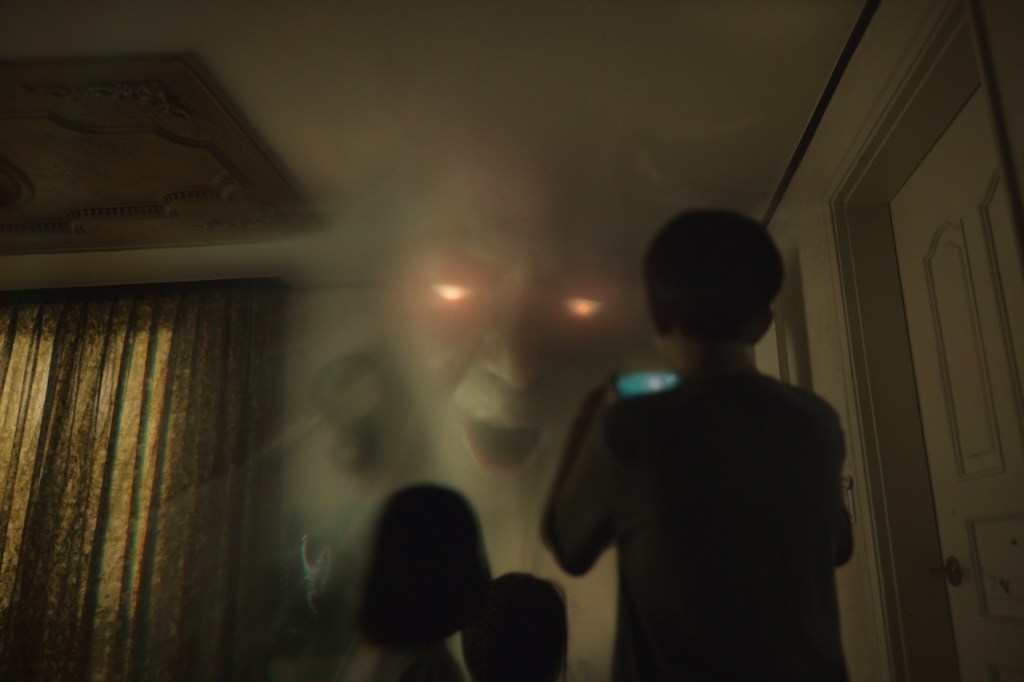Hellbound is an interesting speculative fiction piece in that, while it initially presents its central conflict as one between humanity and something supernatural and/or divine, it is actually much more ambitiously interested in exploring the very human reactions and systems that spring up as a result of the supernatural phenomenon. That being said, there are still monsters in this show, and therefore we still have many questions about what they might be—especially given that, by the first season’s conclusion, we still don’t have any in-world conclusions. That means we have to extrapolate some conclusions from the evidence we do have. Let’s lay it out…
What Are the Hellbound Creatures?
While the Hulk-like killers get most of the press, there are actually two kinds of supernatural entities in Hellbound: the “angels” and the “demons.” The “angels” are the creatures that deliver people’s death sentences. They manifest as a giant, floating face hovering ominously in the air, giving their targets an exact time for their deaths as well as the news that they are bound for hell.
Interestingly, in Yeon Sang-Ho’s Hell: Two Kinds of Lives, the animated short film that first used this premise, the “angels” come to people who are bound for hell and heaven alike. In Hellbound, however, they only seem to give mandatory invitations to hell. And then there are the creatures who carry out the sentence…
What Powers Do the Hellbound Monsters Have?
Hellbound opens with a disturbing scene: a man is chased through the streets of Seoul by three massive supernatural creatures. They catch him, beat him into submission, and then burn him to a crisp before disappearing through a portal.
We don’t know where the monsters come from or where they go, though the New Truth wants everyone to believe that the monsters have been sent by God and that their victims go to hell, as the “angels” decree. We do know that the monsters always appear in groups of three (and are potentially the same three monsters every time?). We know they have many supernatural abilities, including superhuman strength and size, as well as the ability to transform their limbs into vine-like appendages or spears, allowing them to trap and skewer their targets. They know where to find their victims, appearing through a portal that opens close to where the intended victim is, and they always end their violent appearances by gathering around their fallen victim, raising their hands to the fallen human, and using the combined burn of an emanating light to burn their target into a crispy skeleton.
Hellbound’s Creatures Are Fallible
While Hellbound‘s “angels” don’t seem to be corporeal, the monsters who show up to kill the decreed are, by necessity, tangible and therefore able to be fought. This is proven in the first season’s final episode, which sees Hyejin take them on with whatever weapons she has handy. While she is soundly trounced by the much larger, much physically stronger creatures, she shows that it is possible to fight back and that humans can have some effect on these creatures. If humanity were to get organized, we might be able to stop them from killing their targets. (Though we know that bullets have little effect on them, as Detective Jin did try to shoot them to protect Park Jungja.)
Past Hyejin’s impressive showing, Sohyun and Youngjae’s sacrifice that allows Baby Toughie to survive proves that these creatures also can make mistakes, which makes them feel much more mortal than ever before. Traditionally, to be divine means to be incapable of making mistakes, as everything is part of a larger plan that humans will never be able to comprehend. The monsters’ inability to kill Toughie in Episode 6 certainly puts a chink in the New Truth’s conclusion that the monsters are divine—or, if not, challenges the definition of divinity as something incapable of making mistakes.
Are Hellbound’s Creatures Sent By God?
If it were just these monsters, it might be easy to dismiss the New Truth’s interpretation of the demonstrations as complete bullocks. However, the monsters in combination with the prophetic, floating faces is a tough combo to ignore, not to mention Park Jungja’s season-ending rebirth certainly imply the existence of something we would understand as divine. I’m both intensely curious to hear what Jungja has to say in a potential Season 2 and nervous to see this show potentially move past an exploration of human systems of morality and accountability to fully explain what is happening.
By the end of Season 1, it seems safe to say that the monsters are sent by a force we humans would understand and/or describe as God. Radically, Hellbound seems totally disinterested in actually debating on the existence of God in its fictional world. Rather, it is ready to move on to the next question: Why should we accept what God is demanding of us? The stand that Hyejin, Sohyun, and Youngjae make in the final episode is a rebellion against divine power. In the end, they are not interested in trying to interpret God’s will; they simply want to protect the innocent. Hyejin in particular is resolute in her perspective: if this is God, then God is wrong.
Do you think the monsters in Hellbound are sent by God? Let us know your theories in the comments below.
